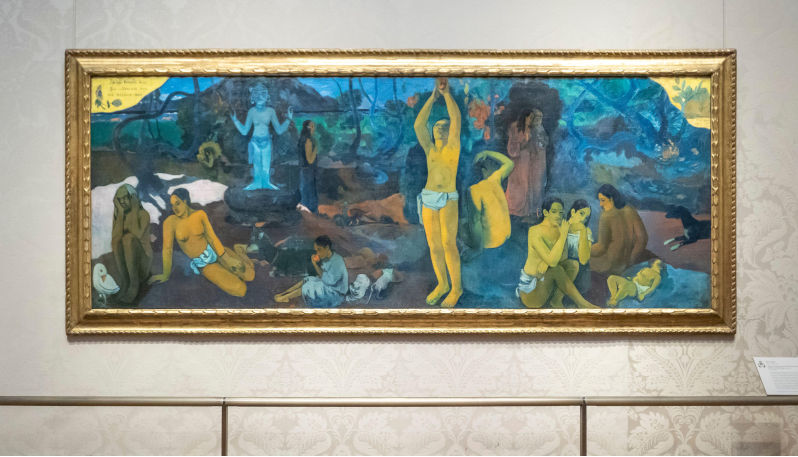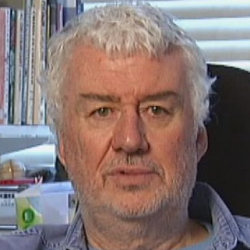Military operations seen through Gauguin, the Colosseum and responsibility
July 20, 2025
Public policy in general, and the military operations given the titles “Swords of Iron”, “Gideon’s Chariots” (by Israel) and “Midnight Hammer” (by the Pentagon), more specifically, need to be understood in terms that transcend the purely strategic and which can be dismissed only at the risk of condoning barbarism.
And that is because there are times when great works of culture and art which express existential questions are particularly liable to provoke reflections on what world politics is producing and most of us are observing.
One of those times is now: inter alia, a kaleidoscope of high-tech violence — routinised, genocidal, self-delighting — is being presented for our delectation and approval. By way of just one example, to be a Palestinian in Gaza is to bear witness to suffering, despair, injustice, and ultimately the truth Shakespeare puts is the mouth of Gloucester in King Lear: “As flies to wanton boys are we to th’ gods: They kill us for their sport.”
In Australia, and elsewhere as well, this kaleidoscope forced those watching to question the very meaning of politics among nations. Though seldom cited, the overlay of politics is inadequately defined as Harold Laswell’s “who gets what, when, and how” but, ultimately, by the answers to the three famous questions in Paul Gauguin’s painting: “Where Do We Come From? What Are We? Where Are We Going?”
These are not only questions that are difficult to answer; they can be terrifying. Indeed, and worse, the overlay they provide is unstable, prone to dismissal as being too abstract, therefore not pragmatic, and a distraction from the realities of power politics as understood by self-styled cognoscenti and those in government.
For these the world of possibilities — again narrowly and self-defined — is an alliance relationship that is intimidatory to the point of mandating a reflex in all subordinate partners which anticipates agreement with whatever strategic fantasies are current.
The standard test of political action — whether such adventures make things better or prevent them from getting worse — is honoured only in the breach and with the aid of distractions in the form of shoddy and shameless justifications and obscene spectacles.
Consider the extended moment. The attentive public in general are aligned with Gauguin. The government, on the other hand, alert to the need not to antagonise its dominant alliance partner, and its surrogates, reveals itself as a closet spectator at the contemporary Colosseum.
“Swords of Iron” and “Gideon’s Chariots” — genocidal campaigns that were never denounced by government in the terms they deserved — are relegated in favour of gratefully accepting and discreetly applauding “Midnight Hammer”. Questions are confined to those relating to just how successful this latest demonstration of American technophilia had been as a destructive force on Iran.
Accordingly, the question remains as to how this operation was undertaken, given that its basis required the rejection of the unanimous findings of the 16 US intelligence agencies that Iran was not engaged in a nuclear weapons program and relied instead on the acceptance of assessments of very dubious provenance provided by Israeli intelligence.
This is no mean exercise in transformative political engineering: from the introspection of the public to being directed to share the government’s role as spectator at asymmetric combat presented as entertainment.
Within it, humanity is elided, and a temptation is subtly introduced to agree to the proposition that the end justifies the means. This involves a transformation in ethics: from the widespread revulsion (albeit sotto voce at the level of government) that Israel’s destruction of Gaza was ethically repugnant to the broad consensus at the same level that the attack on Iran was somehow justified.
For the hard-headed realists, nostalgia: wasn’t the regime in Iran intent on developing nuclear weapons in the very near future? Wasn’t it, in any case, and on many counts, odious? Shouldn’t it be removed by whatever means that were necessary? Wasn’t “Midnight Hammer”, therefore, a welcome reprise of the days of the responsible use of American power – when the “liberal hawks” and neocons bestrode the world after 1945 and kept it safe for democracy and human rights even if meant underwriting figures who were categorically opposed to both? For the hard-headed realists, “Midnight Hammer” made the world safer, and we now live in a better world thanks to the “12-Day War.”
If we do, that world is Orwellian. Among its casualties must be counted the legacies of Nuremberg Principles, international law, international humanitarian law, and the agreements on nuclear non-proliferation just to name a few.
Iran? For how long can this country of 91 million be coerced and harassed by the US surrogate that is Israel with a population of 7.7 million (of whom 2.1 million are Arabs)?
It is a country readymade for resentment: Israel claims it wants regime change in Tehran – but to what? It would be well to remember that Western-initiated regime change in the 1950s ushered in the Shah’s despotic regime and with it, courtesy of General Norman Schwarzkopf Sr, the involvement of the security forces in politics and the establishment of SAVAK (Organisation of National Security and Information), the secret police and intelligence service which protected the regime by arresting, torturing and executing many dissidents.
For the future, then, it would be folly to believe that a dialectic is not at work and that Iran is not considering forms of defence or retaliation that will undo the ostensible successes of the “12-Day War”.
And then there’s the status of the spectators in the Colosseum. In those parts of the world accustomed to enduring the sport of inscrutable powers, the conclusion is that those applauding from the grandstands are, at the very least, complicit in its crimes. They are guilty by association.
To this charge they will plead not guilty, but not convincingly. Their histories, and Australia is deeply embedded in the record, speaks of courtiers, vassals or satraps (depending on the prevailing circumstances). By nature of their service they acquire the enemies of those who dominate the alliance, regardless of there being an actual threat to them.
This becomes an acute disfigurement of Australian democracy in an age dominated by a leader with both a pre-Copernican delusion as to his centrality, and a personality which presents as a constellation of dangerous idiosyncrasies.
At its core are two questions. Both arise from a sense that the collective — the Australian people — are diminished by what has been done and is being done in the name of that collective (always providing that one accepts that such a singularity exists).
The first is that, if we accept the dictum of Albert Camus, that our obligation as thinking people is never to be on the side of the executioners, then what real, immediate recourse is there in the face of the frustration which erupts when government cowardice is unconscionable? Where is the timely redress?
Expressed differently, where do those with this grievance make their plea; those who say to government that your failure to act with courage is inhumane, illegal, unethical and immoral; that you have no mandate from us to enact criminal policies in our name?
The short answer to this extended question is that, under current conditions, timely address is neither expedient nor opportune; temporising circumspection is the order of the day.
In turn, that evasion precipitates the second question, that of national culpability. For this there is invaluable instruction to be taken from the great Polish American leader, teacher, theologian, and activist, Rabbi Abraham Joshua Heschel.
In brief, his eminently reasonable proposition is that, “In a democratic society, not all are guilty, but all are responsible. To be responsible, we must respond.”
Now, here’s the rub. If the distinction is made between individuals who make decisions according to raison d’etat which the citizenry justifiably find unacceptable, then the former are guilty but the latter are responsible for addressing. This, of course, presupposes active participation by the citizenry.
Failure to address seriously unacceptable decisions is evidence of not only a government which is unaccountable, but indifferent of the citizenry. Which is to say a situation in which harmful acts can be committed without consequences.
Whatever else it is, it is not worthy of the description “democracy”. Unless, that is, the citizens’ obligations to democracy are fulfilled merely by voting. Is that what it’s all come to: the political version of a weapons concept — fire and forget — whereby after an initial action is undertaken, no further monitoring of the outcome is entered into?
The views expressed in this article may or may not reflect those of Pearls and Irritations.


